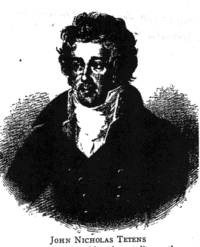Alberto Vanzo writes…
A couple of weeks ago, I introduced Christian Wolff as an example of knowledge of experimental philosophy in Germany during the first half of the eighteenth century. Wolff knew, among others, Boyle’s, Hooke’s, and Locke’s works and he criticized Newton’s rejection of hypotheses in the field of natural philosophy.
However, the fact that Wolff knew leading experimental philosophers does not mean that he regarded them all as exponents of one and same the movement of experimental philosophy. Did eighteenth century German philosophers identify a continuous tradition of experimental philosophy? If so, what did they regard as the distinctive features of that tradition? What authors did they regard as its representatives?

Johann Nicolaus Tetens
Today I am going to sketch the answers that Johann Nicolaus Tetens gave to these questions. Tetens was one of the brightest minds in Germany in the second half of the eighteenth century. The essay on which I am going to focus was published in 1775, six years before Kant’s first Critique. It is entitled On General Speculative Philosophy. It contrasts speculative philosophy [speculativische Philosophie] with observational philosophy [beobachtende Philosophie].
Observational philosophy is a philosophy which relies on observation. Observation, in the relevant sense, is a form of introspection. It takes place when we disregard the relation of our mental representations with the objects they are about and we regard our mental representations as “something subjective, modifications of ourselves”. Observation enables us to discover truths about God, the human soul, and the world, to which we have access
- without previous general speculations on substance, space and time, etc. […] Reid, Home, Beattie, Oswald, and also several German philosophers have proven this beyond doubt with their reasonings and with the proofs that they have put forward.
This passage makes clear that Tetens’ observational philosophy is actually Scottish common sense philosophy – a movement that had a great influence in Germany in the 1770s. Scottish common sense philosophy was an incarnation of experimental philosophy. Tetens’ contrast between observational and speculative philosophy is a version of the experimental-speculative distinction.
According to Tetens, common sense and introspection provide us with a stock of hypotheses and intuitions. These form “the terrain that one must cultivate when doing speculative philosophy.” Speculative philosophers must reformulate those intuitions in well-defined terms, look for systematic links between them, assess their truth, seek for reasons to believe them to be true, and so on. The philosophy that Tetens advocates in 1775 combines an initial observational stage with a later speculative stage.
According to Tetens, this means combining the virtues of British and German philosophy. Tetens regards observational philosophy as a distinctively British movement (with French and German followers) and speculative philosophy as a distinctively German tradition:
- British philosophers could be our models in observing; but they should not be our models in speculative philosophy. … New [British] philosophy was first shaped by Bacon and later by Locke. […] Bacon’s [New] Organon, regarded as a set of directions to perform observations and to extend empirical knowledge, is a masterwork … Locke’s books on the human understanding contain an excellent model for employing that method in the knowledge of our soul and its operations. Yet both of their logics are insufficient on the other side [scil. the speculative side] … British philosophy was nearly only an observational philosophy, an empirical physics of man.
Tetens identifies a continuous tradition of experimental (or in his terms, observational) philosophers stretching from Bacon to Reid, through Locke, Hume, and Condillac. This shows that the existence of a tradition of experimental philosophy and its opposition with speculative philosophy (ESP) were known to Kant’s contemporaries in the mid-1770s.
Over the following two decades, Kant adumbrated a new distinction between empiricism and rationalism. His followers (Reinhold, Tennemann) chose to privilege it over the ESP that they could find in Tetens’ text from 1775 (and elsewhere). Given their knowledge of the ESP, their choice to privilege the new distinction between empiricism and rationalism must have been a deliberate one. What reasons motivated that choice? Do let me know your thoughts in the comments!


2 thoughts on “Tetens on Experimental vs Speculative Philosophy”
You say “Tetens identifies a continuous tradition of experimental… philosophers stretching from Bacon to Reid, through Locke, Hume, and Condillac.” Does Tetens think Newton is part of this tradition?
No, he does not. Tetens does not include Newton in his list of British observational philosophers. This omission seems deliberate. Tetens writes that Newton’s “greatness did not show itself less in his still important observations than in his deep general theoretical intuitions”.
Eric Schliesser might have found an unexpected eighteenth century ally in his distinction between a Baconian tradition of experimental natural philosophers on the one hand, and those authors, like Newton, who advocated “(mathematical) theory mediated measurement” on the other.